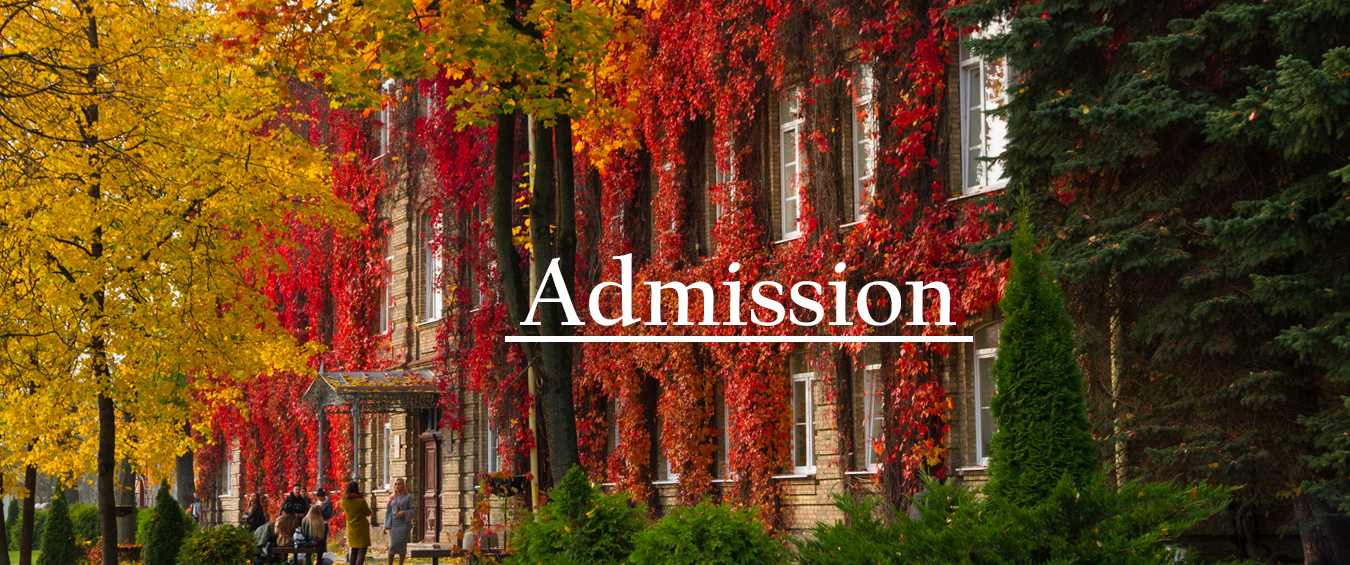
Yanka Kupala
State University of Grodno
Super User
Yanka Kupala State University signed a contract with a new resident of the Science and Technology Park
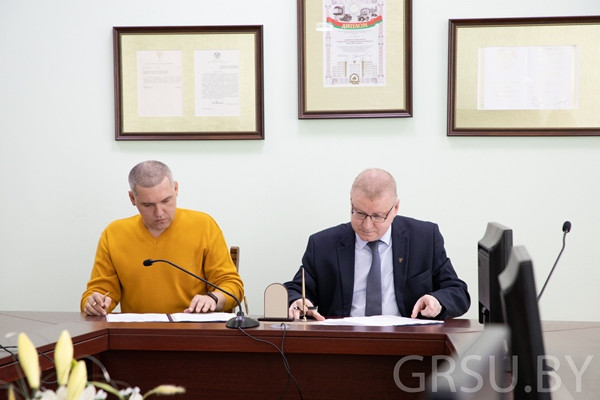
An individual entrepreneur Alexey Tulko, who is implementing an innovative project related to the maintenance of household sewing machines, have become a new resident.
The resident company of the Technology Park, founded by Alexey Tulko, is engaged in maintenance and repair of household sewing equipment. At the same time, the main activity of the entrepreneur is to extend the service life of sewing machines.
– We have been repairing household sewing equipment for the past five years and today we can confidently say that with the help of regular proper maintenance of sewing machines, you can extend their service life by 2 – 3 times, - said Alexey Tulko. – I noticed the problem and built my business model on its solution. The fact is there are several components and assemblies that constantly require attention in household sewing equipment. And you can extend their service life by using the innovative lubrication system and technology that our resident company offers.
Alexey Tulko decided to implement his business idea using the capabilities of the Yanka Kupala State University Science and Technology Park. It is attracted by both the preferences provided to Technology Park residents in the form of tax incentives, and the availability of advanced scientific ideas. This will contribute to the rapid growth of the business, - Alexey Tulko is sure.
- The Science and Technology Park was created for the development of small innovative businesses. And a prerequisite for all residents of the Technology Park is the innovative nature of their activities – Yury Ramanouski, Vice-rector for Science at Yanka Kupala State University. – Today, the Science and Technology Park has its 11th resident. And I would like to note that four of the already registered residents of the Technology Park are companies and enterprises created by teachers, students and graduates of Kupala University.
The document on creating a new resident company was signed by Alexander Vasilevich, Director of the Yanka Kupala State University Science and Technology Park, and Alexey Tulko, an individual entrepreneur. As the Vice-rector for Science Yury Ramanouski, who was present at the signing of the agreement, noted, an application for registration of the next resident of the Technology Park is currently being considered. It is known that it will be a student of Yanka Kupala State University of Grodno.
A multimedia studio for recording video lectures was created at Yanka Kupala State University
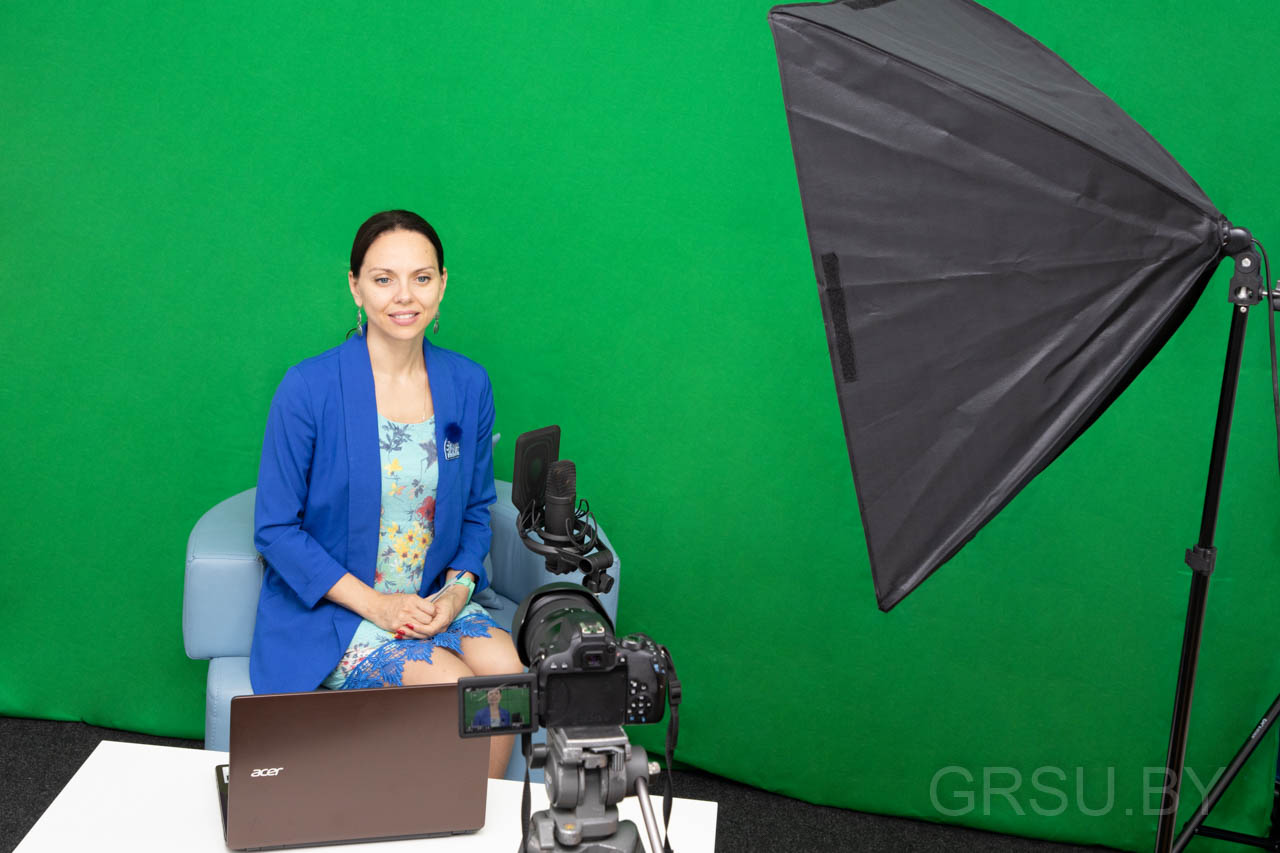
Teachers are invited to take advantage of the opportunity to create video lectures for distance learning.
The studio for recording video lectures is equipped on the basis of Kupala University media centre as part of the Erasmus+ PRINTeL international technical assistance project "Changes in the educational environment: promoting innovative teaching and learning to improve students’ educational activities in the Eastern partnership countries". The capabilities of the new multimedia studio will allow you to create high-quality educational video content.
According to Marina Kolotsey, head of the Educational and Methodological Department of Yanka Kupala State University, information and communication technologies are increasingly used in the educational process at the University. Since this academic year, the training of specialists of the 1st stage of higher education in 4 specialties in the distance form has started. Methodological support of the educational process using ICT requires new approaches. University teachers are increasingly using audio and video materials to develop electronic teaching materials.
All interested teachers can use the opportunity to record video lectures for further posting on the university's educational portal. For organizational and methodological issues of recording video lectures, you can contact the laboratory of educational innovations to Oleg Vladimirovich Kolyago by phone number (0152) 77 05 06.
Certificates to the best applicants
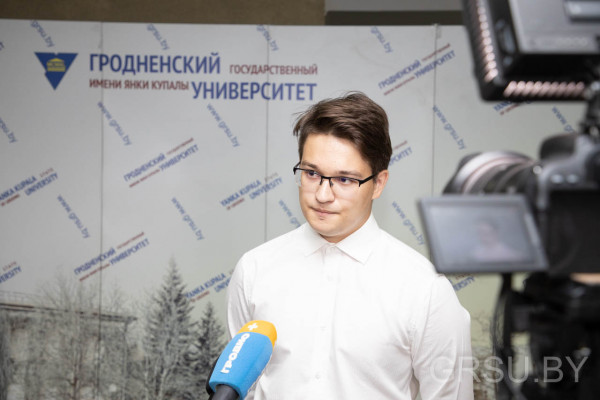
The highest result according to the results of Сentralized Testing this year has 38 applicants from the Grodno region.
On the first day of issuing Centralized Testing certificates at Yanka Kupala State University of Grodno, documents with a hundred-point result were traditionally handed over to applicants in a solemn atmosphere. The ceremony was attended by the head of the main Department of education of the Grodno Regional Executive Committee Ruslan Abramchik and the first Vice-rector of Yanka Kupala State University Aleh Ramanau.
-I want to wish the best entrants in our region good luck in the future, because now they have to make a serious choice – choice of profession, – the head of the main Department of education of Executive Committee Ruslan Abramchik said. –I would like to thank the teachers who were involved in the organization of the Centralized Testing. Thanks to their well-coordinated and competent work, the testing was successful. And, of course, I want to note the high level of training of applicants. After all, this year we have more hundred-point results than last year.
One of the most notable participants of the event was an applicant with two hundred-point results. Andrey Gaiduk received the highest score on the results of testing on the History of Belarus and World History. He did not think for a long time about the question of choosing his future profession deciding to enter the History Department. However, Andrey still keeps in secret the name of his future university.
But Evgeny Zanevsky, who has 100 points in mathematics, 91 in English and 88 in Russian, decided on the choice of higher education institutions long ago. He will be among the first applicants of Yanka Kupala State University of Grodno.
– Last year I decided that I would enter Kupala University. I will apply to the Faculty of Mathematics and Computer Science on the first day of the admission campaign – Evgeny Zanevsky shared his plans.
Aleh Ramanau, first Vice-rector of Kupala University, assured the participants of the event that the best applicants who entered Yanka Kupala State University can count on the further development of their talents and support from competent teachers.
– We are waiting for you at our university, where you can continue your education at a very high level. Yanka Kupala State University implements the concept of support for gifted youth, we have created additional conditions for the development of the best students, – Aleh Ramanau said. – The highest results in centralized testing is your first big victory. This is a good start, which will certainly give you confidence in your abilities. You have many more victories ahead of you that will lead you to professional success.
On July 24, certificates were issued to participants of the Сentralized Testing 2020. According to the head of the Regional Centre for Testing and Professional Orientation of young people of Yanka Kupala State University of Grodno, Oksana Valiuk, this year more than 5 thousand applicants wrote tests in the Grodno region. Entrance tests were held at a high organizational level, without violations. The next stage of the admission campaign - acceptance of documents to higher education institutions of the Republic of Belarus started on July 25.
Student of Yanka Kupala State University of Grodno took part in a meeting of the Chairman of the Council of the Republic Natalya Kochanova with members of the Youth Council at the National Assembly of Belarus
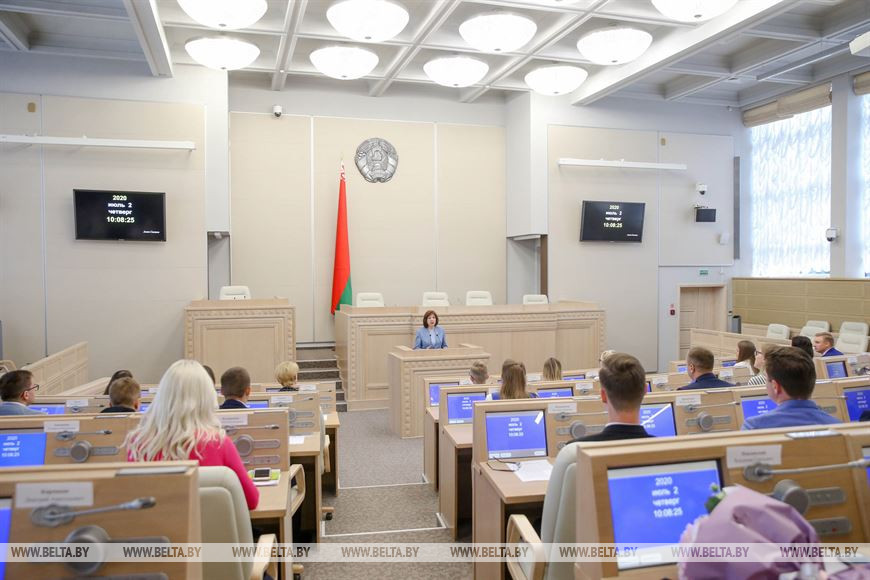
Kupala University was presented at the meeting by the chairman of student government Alexei Oborin and student of the Faculty of Physics and Technology Kirill Sakovich.
During the meeting Natalya Kochanova wished the young people success and promised all kinds of support from the parliamentarians. “We will do our best to make you feel as satisfied as possible with this work”, - she said, addressing young colleagues.
“Everything that concerns the futute of the country is connected with youth”, she pointed out. The Council included people who, despite their age, managed to achieve significant success in their studies and in their profession. Moreover, they want to be useful society, they have a serious civic position.
“We will definitely involve our collegues from the Youth Council in the field meetings of the Standing Commissions in the regions”, - Natalya Kochanova added.
Barcamp was held at Yanka Kupala State University of Grodno by Project 2020
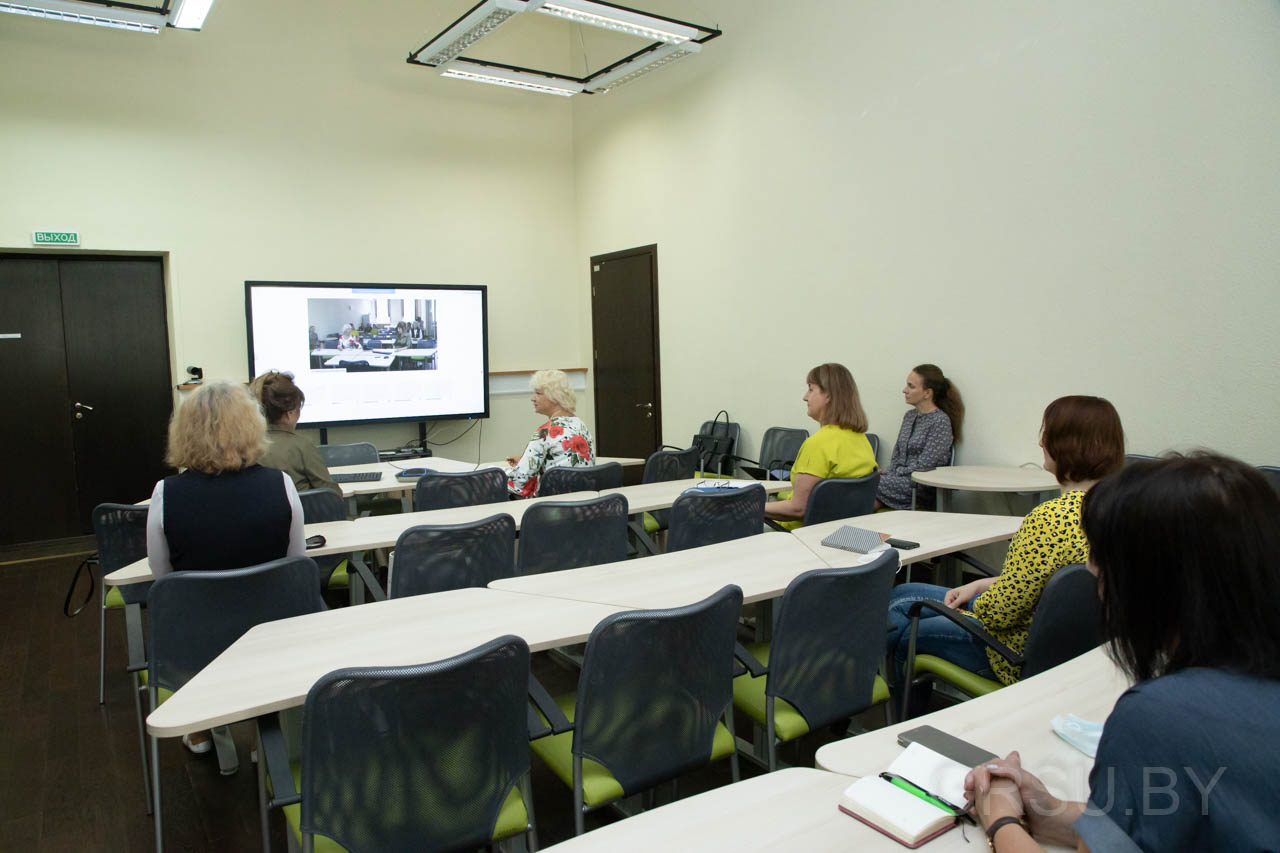
Project activities as a means of forming the required competencies of teachers and students were discussed by the participants of the barcamp of the third neo-conference.
The conference was attended by teachers of schools, universities of the Republic of Belarus, as well as teachers from Russia, Kazakhstan and Montenegro.
Elena Livak, Dean of the Faculty of Mathematics and Informatics, opened the event and greeted the participants. She emphasized the importance of network project activities for the implementation of educational standards, and also noted the important role of Kupala University in solving the problems of creating a networked educational space.
The conference was devoted to the development and implementation of educational network projects in the educational process, which are a set of innovative educational ideas organized within the framework of network partnerships using network computer technologies.
The participants discussed the problems of organizing and implementing network project activities, cooperation in the project, and its place in state standards. As a part of the event, master classes and training were held.
President of Belarus Alexander Lukashenka presented state awards on July 2nd
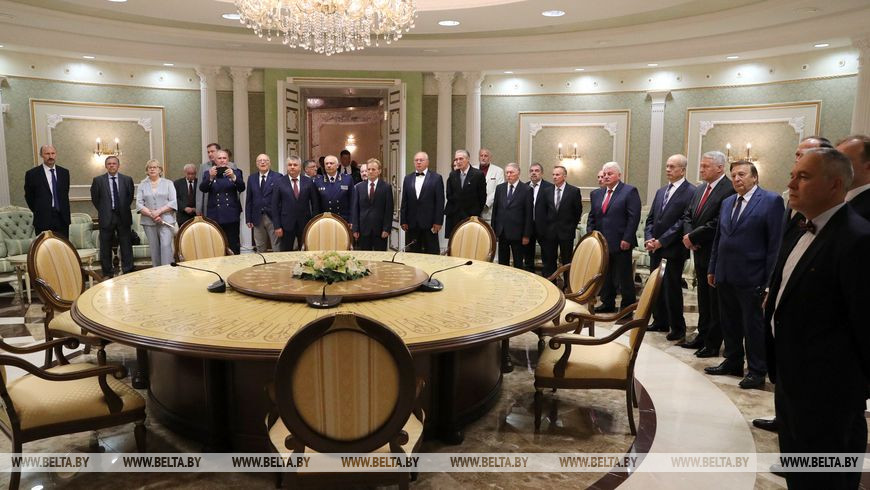
The head of the department of fundamental and applied mathematics Yevgeny Rovba, who was awarded by the title “Honored Worker of Education of the Republic of Belarus, took part in the ceremony.
“Looking at you, I feel pride and deepest gratitude, “the Head of state emphasized during the award ceremony. – Today, we all have, one might say, a triple holiday”. President explained: “Firstly, you have been awarded by state awards for outstanding professional achievements that glorify our Belarus”.
Secondly, the special solemnity of the meeting is given by the fact that the awarding takes place on the Eve of the most important day – Independence Day.
Thirdly, in 2020 the whole word is celebrating the 75th anniversary of the Great Victory in World War II. “We bow low to all veterans. There is a participle of immortality in our children and grandchildren, in our professional success”.
It is worth noting that the medal “For Labour Merit” was awarded to the Vice-Rector for Academic Affairs of Yanka Kupala State University of Grodno Yury Bialych.
It is worth noting that the medal “For Labour Merit” was awarded to the Vice-Rector for Academic Affairs of Yanka Kupala State University of Grodno Yury Bialych.
Teachers of Yanka Kupala State University of Grodno were awarded by academic degrees and academic titles
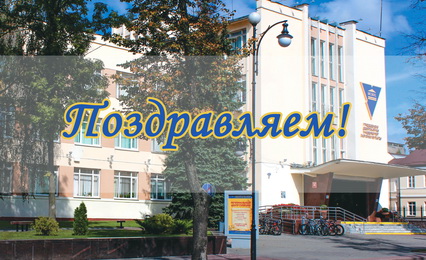
The meeting of the Presidium of the Higher Attestation Commission of the Republic of Belarus was held on July 1st.
The academic degree of Candidate of Philology was awarded to Elena Bogdevich, a teacher of the Department of Russian Philology of Yanka Kupala State University of Grodno, scientific supervisor – Doctor of Philology, Professor T.E. Avtukhovich.
The academic degree of Candidate of Biological sciences was awarded to the graduate of the postgraduate study of Yanka Kupala State University Dmitry Semenovich, scientific supervisor – Doctor of Biological Sciences, Professor N.P. Kanunikov.
The academic title of associate professor was awarded to the head of the Department of foreign languages Svetlana Gonchar, associate professor of the Department of language training of Belarusian and foreign citizens Natalia Muzychenko, associate professor of the Department of Journalism Anna Ryzhkovich, associate professor of Romance and Germanic Philology Tatiana Skorobogataya.
The academic degree of candidate of physical and mathematical sciences was awarded to Ivan Stolyarchuk.
Admission board to the master's degree started working at the Yanka Kupala state University of Grodno
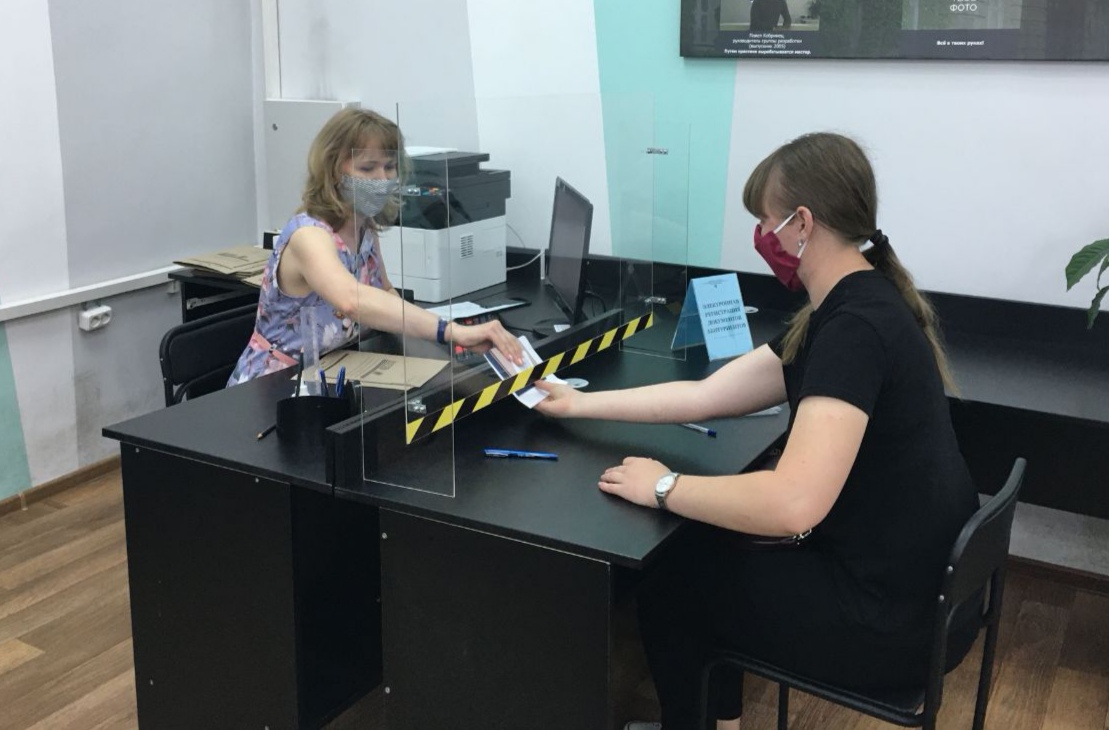
You can apply for master’s degree from June 27 to July 5.
The first three master's degree applicants were congratulated by the vice-rector of education Yuri Yatsentovich Romanovsky and the responsible secretary of the admissions board Irina Korlyukova. They wished them success in master's degree and expressed its expectation to see the current master's degree applicants as PhD students of the Yanka Kupala state University of Grodno.
This year, you can continue your education in the master's program at Kupala University in 22 courses with 20 specializations. For the first time, a set of three new specializations was announced – "Special education" for the course "Theory and methods of training and education", "Legal support of public authorities" and "Legal support of economic activity" for the specialty "Jurisprudence".
In 2020, the Yanka Kupala state University of Grodno organized an electronic queue on the website www.abit.it, on the page "Master's degree", which allows each applicant to choose the time for a personal visit and submission of documents to the University's admissions board. Acceptance of documents from graduates of the Yanka Kupala state University of Grodno takes place with the direct participation of faculties, which support in the processing of the necessary documents.
Entrance exams for master's degree applicants will be held according to the approved schedule on July 7 and 9, and consultations on July 6 and 8. When the applicant registers his/her documents, the electronic system automatically determines the date and specific time of attendance for each person.
Enrollment in the number of students of the master’s degree of full-time and part-time forms of education at the expense of the national budget will be held on July 13, on a paid basis – on July 16.
Admission of documents to the master's degree the Yanka Kupala state University of Grodno is held from June 27 to July 5 (June 28 and July 3 – weekends) from 9.00 to 18.00 at the address ul. Ozheshko, 22, room 211. The terms and conditions of admission, a list of courses, forms and terms of study, a list of necessary documents, entrance exams, and other useful information can be found on the website abit.by.
Applicants of the Yanka Kupala state University of Grodno have possibility to submit documents and find out about enrollment online
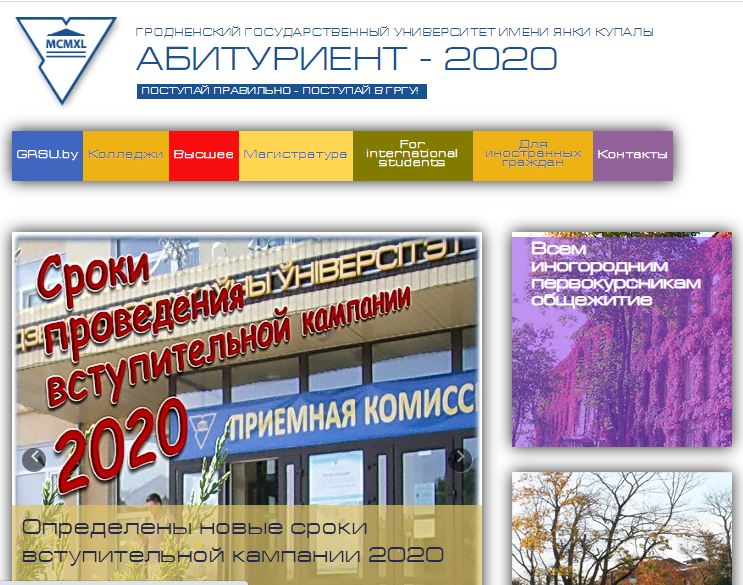
To submit documents to the admissions board, the applicant must register on the website abit.by where his personal account will be created automatically. Each applicant can fill out an application form and upload a photo for your student ID-card at any time. The service allows attaching electronic copies of documents for the enrollment. After receiving the entrance certificates, the applicant has only to write the results on the questionnaire.
After passing the procedure of verification of documents by the admissions board, the applicant can print out the application, contracts for preparation and copies of documents necessary for the personnel file. The applicant have to register in the electronic queue previously , and after it he/she personally has to submit the original documents to the admissions board of the Yanka Kupala state University of Grodno in the period from July 25 to July 31 - for the budget form and from July 25 to August 15 - for the paid form of study. The results of the enrollment and the competition situation in real time will be able in the applicant's personal account.
Service "Digital admissions board ", created by staff and students of the university, gives the applicant opportunities not only to provide documents to the admissions office for previous checking, but also to get expert advice, read all university courses of the Yanka Kupala state University of Grodno and choose a course according to the entrance exams. On the platform, the applicant will be able to communicate online with deans and students of faculties, as part of a virtual tour – visit the buildings and faculties of the University, see the building of a new dormitory, and monitor the status of documents.
It should be noted that the admissions board at the Yanka Kupala state University of Grodno has been working in the virtual space for several years. Over the past years, students have been enrolled at the Yanka Kupala state University of Grodno via the electronic form: the applicant can see the result in the personal account in real time.
After enrolling in the virtual space of the university, each first-year student has their own personal account with all the necessary and up-to-date information: access to the educational portal, educational materials of courses, services of the the Yanka Kupala state University of Grodno, as well as the possibility to create a digital portfolio for the future employment.
The first graduates of the specialty "Customs business" were awarded diplomas of graduation of the Yanka Kupala state University of Grodno
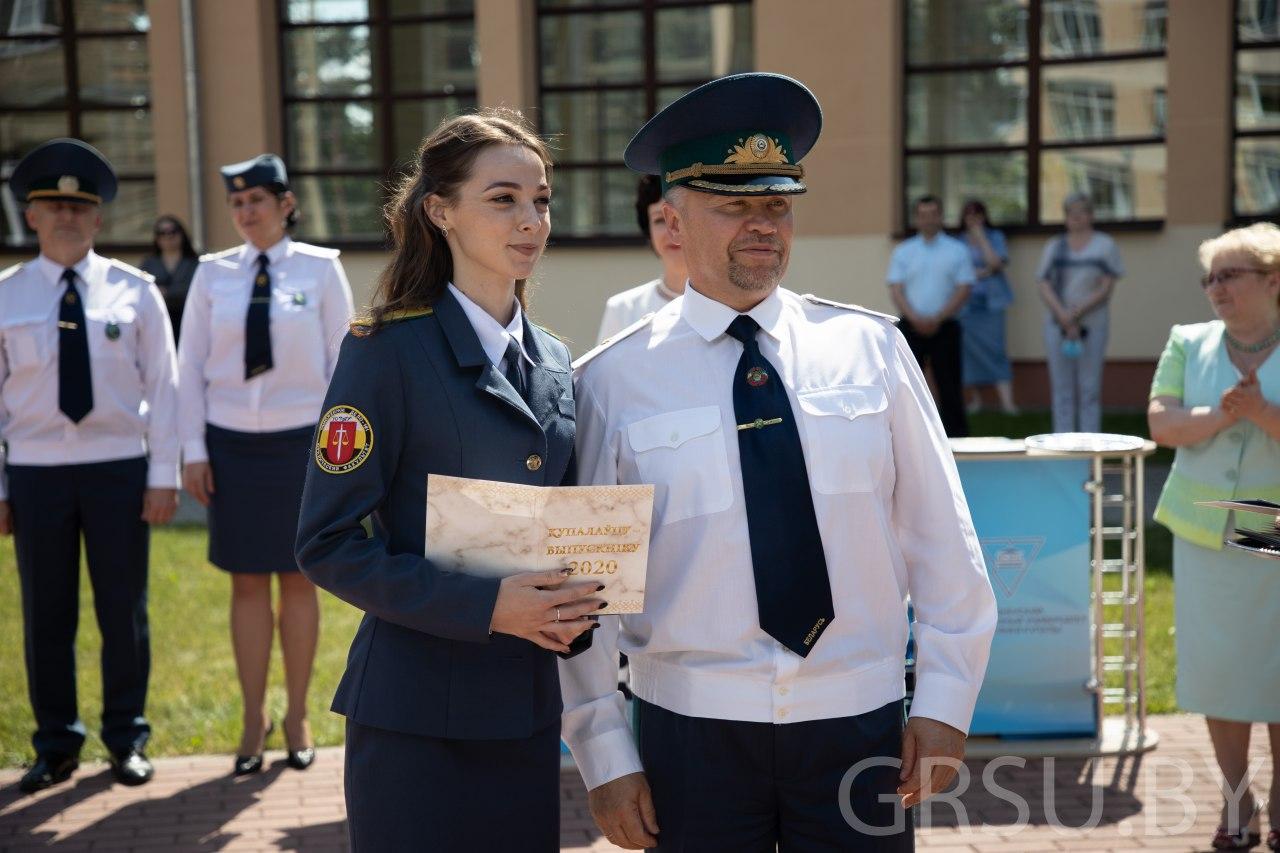
The solemn ceremony took place on June 25 on the University flag Square.
On this day, 27 graduates were awarded diplomas of higher education, ten of them with honors.
Irina Kiturko, rector of Yanka Kupala Grodno state University, congratulated the Kupala graduates:
– You will forever go down in the history of the Yanka Kupala state University of Grodno and Grodno regional customs as the first graduates of the specialty "Customs". Your graduation is special because it takes place in the anniversary year for the University and for the Grodno regional customs. Thank you for the four years we have been together! Remember that you are representatives of the Republic of Belarus, one of the first people who see coming to our country. First and foremost I wish you health and everything else is in your hands!
The rector addressed separate words of gratitude to the chairman of the state customs committee, state adviser of the customs service of the III rank Yuri Senko, head of the Grodno regional customs, state adviser of the customs service of the III rank Andrey Kovalchuk and all employees of the Grodno regional customs.
– All these four years, hand in hand, the university and the Grodno regional customs have been training specialists together. Representatives of the customs authorities took an active part in preparation of the curriculum for the subject area and were offered the possibility of doing traineeships. Therefore, our graduates really received a practice-oriented education – said Irina Kiturko and presented diplomas with honors, certificates for high academic achievements, active participation in research, social and creative activities of the university to graduates and letters of appreciation to their parents.
The guest of honor was the head of the Grodno regional customs, state adviser of the customs service of the III rank Andrey Kovalchuk, who headed the examination commission during the state examinations. He read out a congratulatory address from the chairman of the state customs committee of the Republic of Belarus, state adviser of the customs service of the III rank Yuri Senko. The message of congratulations says that the Belarusian customs is interested in highly qualified personnel who know their business, strive for success and professional growth: "With all my heart, with special attention, I congratulate graduates on successfully passing state exams and getting your degree of qualified customs specialists! Let soar to new heights and open the doors easily! And service in the customs authorities will bring only positive emotions, inspire good deeds and achievements in the name of economic security of our home country Belarus! Dear guys, your yesterday’s conscious choice to be customs officers will become a matter of life tomorrow! We are waiting for you in our confident and professional formation of customs officers!»
On his own behalf, Andrey Kovalchuk also congratulated the students on graduating from the university and noted that he was looking forward to meet the graduates of the Yanka Kupala state University of Grodno as employees of the Grodno regional customs and presented the graduate Ekaterina Golod with the gratitude of the state customs committee of the Republic of Belarus. Some students were awarded the gratitude of the head of the Grodno regional customs. By the way, most of the graduates were sent to their first jobs there.
In turn, the students thanked the university administration, employees of the Grodno regional customs, their teachers, scientific supervisors and parents for their support and guidance during their studies.
– Today is a very exciting day. It seemed like only yesterday we went to the uniýersity for the first time and got know each other. But four years have passed, we have found friends, and now we are getting degree as graduates, - Ekaterina Golod shared her emotions.
